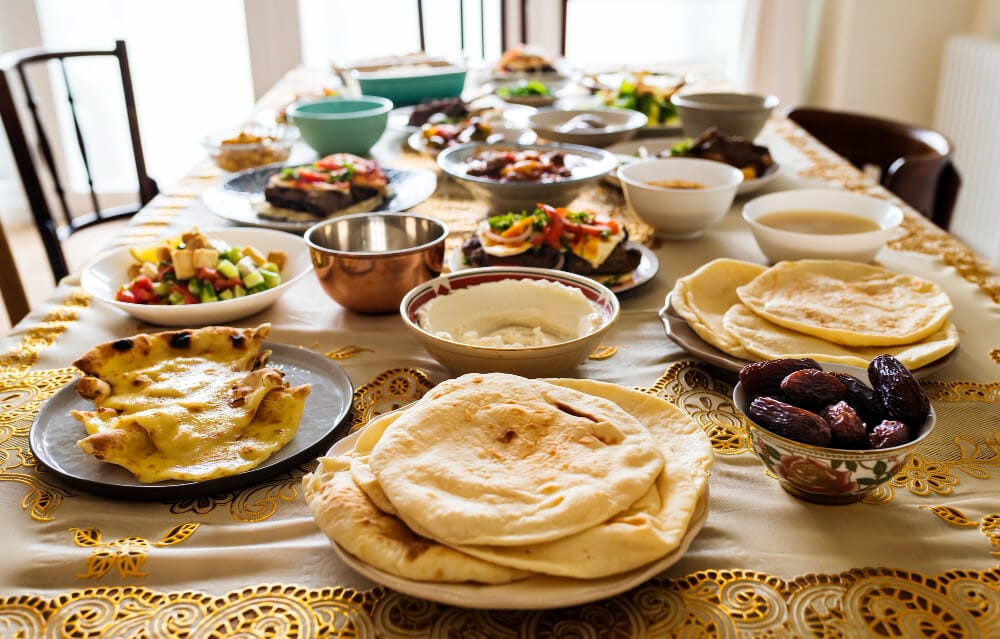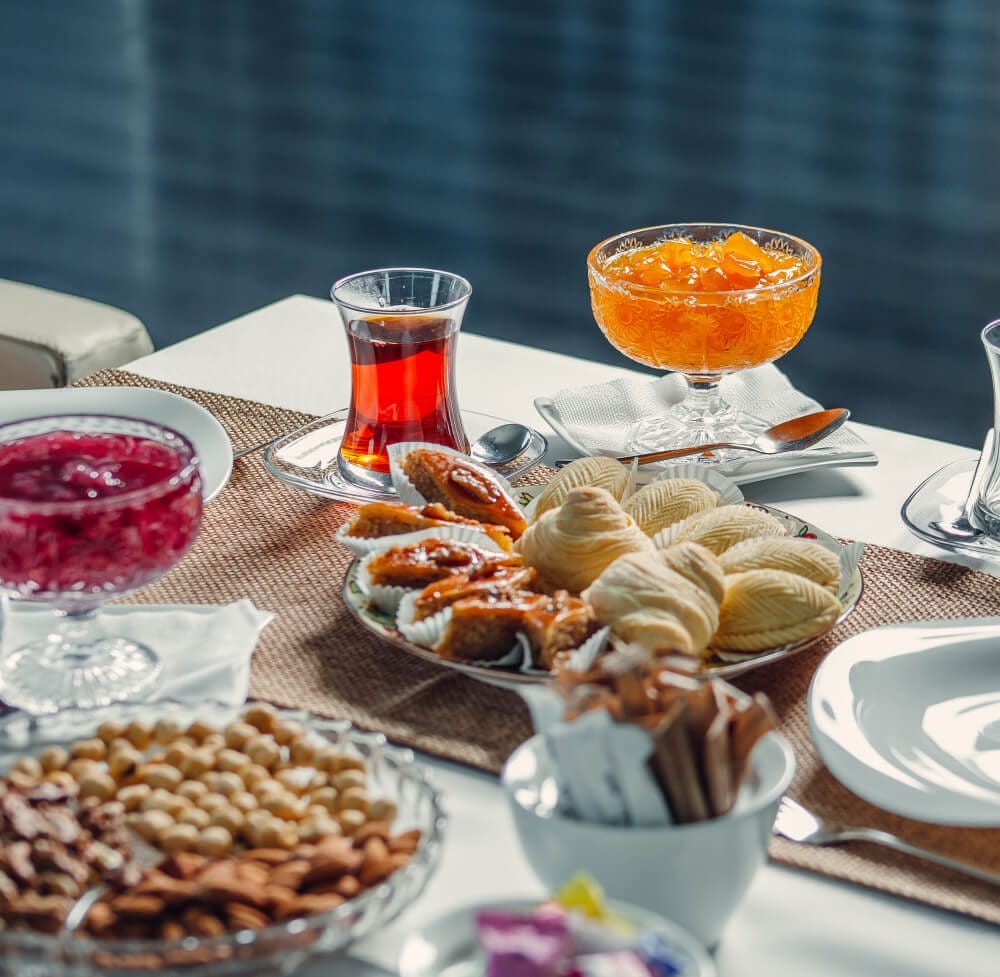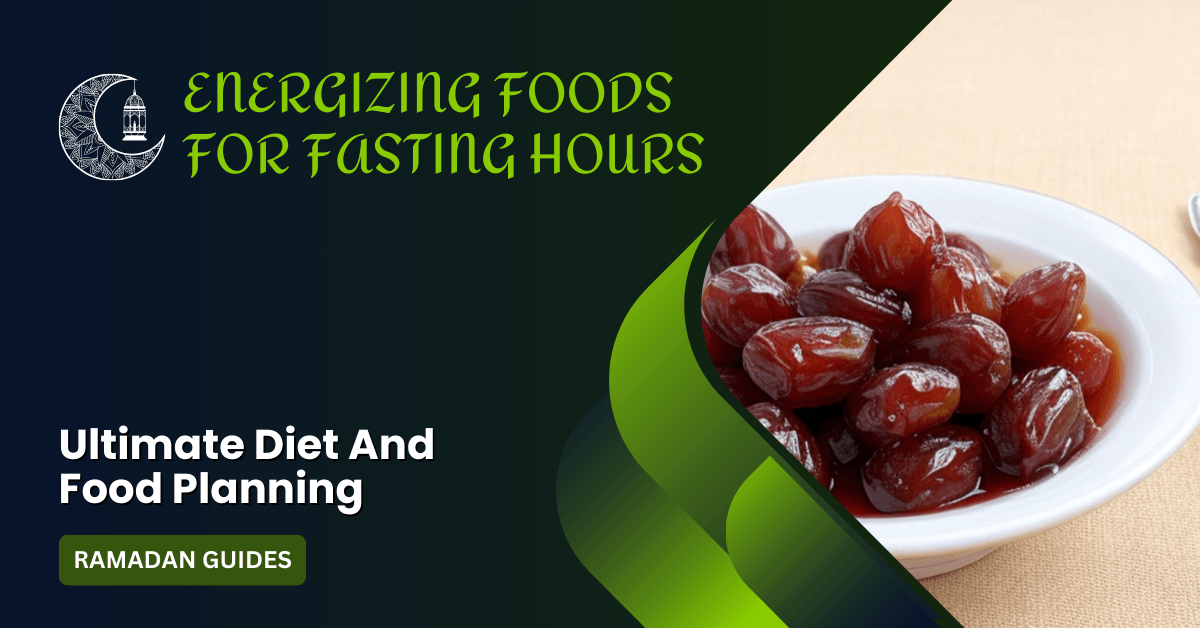When Ramadan rolls around, you’re suddenly on the lookout for foods that not only respect the fast but also keep you powered throughout the day. Yes, foods for fasting hours during Ramadan is crucial in this holy month.
It’s a unique challenge: finding Ramadan meals that are both nourishing and energizing without weighing you down. While your friends might be reaching for quick fixes, I’m here to guide you towards sustenance that truly lasts, ensuring your fasting hours are met with vitality rather than fatigue.
Let’s dive into discovering those powerhouse foods that align with your spiritual journey while keeping your energy levels high.
Energizing Foods For Fasting Hours: Ramadan Guide
- To maintain energy and health during Ramadan, focus on a balanced diet rich in complex carbohydrates, proteins, and healthy fats.
- Hydration is key; drink plenty of water during non-fasting hours, especially at Suhoor, to prevent dehydration throughout the day.
- Incorporate traditional foods from various cultures, as they often contain nutrients beneficial for fasting, but ensure they are prepared healthily.
- Suhoor meals should include slow-digesting foods like oats and yogurt to sustain energy levels.
- Manage fatigue by planning lighter activities during the day and ensuring adequate rest.
- Always consult with a healthcare provider before fasting if you have medical concerns, to ensure fasting is safe for you.

Understanding the Impact of Fasting on the Body
Metabolic Shifts
Fasting changes your metabolism. Initially, your body uses glucose for energy. This is sugar from foods you eat.
After a few hours, this glucose runs out. Your body then starts to break down fat for energy. This process is called ketosis.
Adapting Signs
Your body shows signs when it adapts to fasting. You might feel more alert and less hungry during fasting hours.
Studies show that these signs mean your body is using fat for energy efficiently. Feeling energetic despite not eating for long periods is a key sign.
Hydration and Health Tips for Ramadan Fasting
Pre-Dawn Hydration
Before the sun rises, your body needs enough water to last during the fasting hours. Drinking plenty of water is crucial. It helps you stay hydrated longer.
Aim to drink at least two glasses of water at Suhoor (pre-dawn meal). This will prepare your body for the day ahead. Eating hydrating foods like cucumbers or watermelon can also help.
Choose Wisely
During Suhoor and Iftar (breaking fast), choosing what you drink is key. Water should be your top choice. Avoid sugary drinks as they can lead to quicker dehydration.
Foods rich in water content are excellent too. Think of fruits such as oranges or strawberries, and vegetables like lettuce or tomatoes. They not only hydrate but also provide essential nutrients.
Caffeine Caution
Caffeine might seem tempting for an energy boost but think twice before including it in your Suhoor meal. Coffee and tea can make you feel thirstier throughout the day because caffeine is a diuretic.
Instead, focus on consuming energizing foods that release energy slowly. Foods high in fiber like oats or whole grains are great options.
Nutritional Guide for a Healthy Ramadan Fast
Macronutrient Balance
To maintain health during Ramadan fasting, balancing macronutrients is key. Your body needs carbs, proteins, and fats in the right amounts to function well.
Carbs give you energy. Choose complex ones like whole grains. They release energy slowly, keeping you going longer. Proteins are crucial too.
They help you feel full and repair your body. Lean meats, legumes, and dairy are good sources. Don’t forget healthy fats from nuts, seeds, and olive oil. They support brain health and keep hunger at bay.
High-Fiber Foods
Incorporate high-fiber foods into your pre-dawn meal (Suhoor) for sustained energy release throughout the day.
Fruits like apples or berries add fiber to your diet with minimal effort. Vegetables can be part of any meal or snack.
Whole grains in bread or cereal offer both fiber and essential nutrients. These options not only provide energy but also aid digestion during fasting hours.
Lean Proteins & Fats
Prioritize lean proteins and healthy fats for fullness and nutrition without feeling weighed down.
Lean proteins such as chicken breast or fish are excellent choices that won’t leave you feeling sluggish. Healthy fats found in avocados or almonds satisfy hunger longer.
Combining these with vegetables creates balanced meals that nourish your body while observing fasts.

Healthy Suhoor Meal Ideas for Long Fasting Hours
Oatmeal Mix
Starting your day with oatmeal can keep you energized. It’s rich in fiber and helps in slow digestion. Add nuts like almonds or walnuts for healthy fats. Toss in some fruits such as bananas or berries for vitamins.
This combination balances nutrition and taste. The fiber keeps you full, while the nuts provide lasting energy. The fruits add a natural sweetness, making it enjoyable.
Bread & Eggs
Whole grain bread is another excellent choice for suhoor. Pair it with eggs and slices of avocado for a meal that’s both filling and nutritious.
Eggs are packed with protein, aiding muscle health during fasting hours. Avocado adds healthy fats, keeping hunger at bay longer than usual breakfasts might.
Yogurt Delight
For those seeking a quick option, yogurt mixed with honey and seeds is perfect. It’s easy to prepare yet highly nutritious.
Yogurt offers probiotics essential for gut health; honey provides quick energy without spiking blood sugar levels too much; seeds like chia or flaxseed contribute omega-3 fatty acids which are good for your heart.
These meals not only satisfy hunger but also ensure that your body gets the necessary nutrients to sustain long fasting hours during Ramadan.
By incorporating these into your suhoor routine, you’ll find maintaining energy levels throughout the day becomes more manageable.
Optimal Foods for Suhoor to Sustain Energy Levels
Complex Carbs
To ensure sustained energy during Ramadan fasting, incorporating complex carbohydrates into your suhoor meal is key. Sweet potatoes stand out as an excellent choice. They slowly release energy, keeping you active throughout the day.
Sweet potatoes are not just tasty; they’re packed with nutrients too. Including them in your suhoor can make a big difference in how you feel during the fast.
Protein Sources
Protein-rich foods like lentils are another essential part of a balanced suhoor. Lentils help prevent hunger pangs by making you feel full longer. This is because protein takes more time to digest.
Lentils aren’t only about preventing hunger; they also offer a variety of health benefits. From improving digestion to supporting heart health, lentils are a powerhouse of nutrition.
Slow-Digesting Foods
Barley is one such slow-digesting food that’s perfect for suhoor. It helps keep your energy levels up without causing spikes in blood sugar.
Including barley in your meals can be easy and delicious. Whether it’s part of a salad or used to make porridge, barley adds both texture and nutritional value.

Managing Fatigue and Boosting Energy During Ramadan
Nap Wisely
Taking short naps can greatly reduce fatigue. Aim for 20-30 minutes. This helps refresh your mind without entering deep sleep, which can make you groggier.
Avoid napping late in the afternoon though. It might interfere with your nighttime sleep. Planning your nap times around work or daily tasks ensures you stay productive and energized.
Stay Active
Engage in light physical activities like walking or stretching. These exercises help boost energy levels gently without draining you further.
Aim for a brief walk after Suhoor or before Iftar. This not only keeps your body active but also aids digestion and improves mood during fasting hours.
Eat Lightly
Heavy meals lead to lethargy. Opt for foods high in iron and proteins that provide sustained energy without weighing you down. Examples include:
- Lentils
- Spinach
- Chicken breast
These options help maintain energy levels better than carbohydrate-heavy meals do.
Traditional and Nourishing Ramadan Foods from Various Cultures
Instant Energy
Dates are a staple for breaking the fast during Ramadan. They’re not just a tradition; they’re an excellent source of energy. When you eat dates, your body gets a quick boost. This is because dates are rich in natural sugars.
Many people stock up on dates before Ramadan starts. This isn’t surprising since they offer so much energy after long fasting hours. Eating two to three dates at the start of Iftar can make a big difference in how you feel.
Hearty Soups
Harira is another food that’s popular during Ramadan. It’s a hearty soup that comes loaded with nutrients and helps with hydration. Harira often contains lentils, chickpeas, and sometimes meat, making it very filling.
This soup is perfect for those cold evenings or when you need something warm and comforting. It’s also great for rehydrating after a day of fasting.
Traditional Grains
Freekeh is a grain that many might not know about but should consider trying during Ramadan. It’s packed with fiber and protein which makes it an excellent choice for suhoor or iftar meals.
Eating freekeh can help keep you full longer due to its high fiber content. Plus, it’s versatile enough to be used in different types of dishes, from salads to pilafs.
Addressing Medical Concerns When Fasting During Ramadan
Consult Professionals
Before you decide to fast, especially if you have a health condition, it’s crucial to talk to healthcare professionals. They can give personalized advice based on your health.
If you have a medical condition, fasting without proper guidance might be risky. Your doctor can help create a safe fasting plan for you. This ensures that the spiritual practice doesn’t harm your health.
Monitor Sugar Levels
For those of you with diabetes or prediabetic conditions, monitoring blood sugar levels becomes even more important during Ramadan. Sudden changes in eating patterns can affect your glucose control.
Remember, keeping track of your blood sugar helps prevent complications. It allows timely adjustments in case levels drop too low or spike too high.
Medication Adjustments
Understanding medication adjustments is key for people with chronic conditions during fasting hours. Some medications need timing and dosage changes when fasting.
Your healthcare provider can guide these adjustments to ensure they align with your fasting schedule and maintain efficacy.
Final Note From Dr. Rajarshi Mitra
Navigating the long hours of fasting during Ramadan can feel like a marathon, but with the right fuel, you’ll cross the finish line with energy to spare. From understanding your body’s needs to hydrating smartly and choosing nourishing foods, you’ve got the blueprint to maintain your vitality.
Embrace these tips, from suhoor power meals to traditional delights, ensuring each bite counts towards sustaining your energy and health. Remember, it’s not just about making it through the day; it’s about thriving from dawn till dusk.
Now that you’re armed with knowledge, why not take it a step further? Share these insights with friends and family or get creative in the kitchen with healthy Ramadan recipes.
Let’s make this Ramadan not only a time of spiritual reflection but also a journey towards better health and energy. Your body—and spirit—will thank you.
Ask Dr. Rajarshi Mitra
What are the best foods to eat for Suhoor to keep energy levels up during Ramadan?
Complex carbohydrates like oats, whole grains, and fruits provide slow-releasing energy, keeping you fueled throughout the day. Including proteins such as eggs or yogurt can also help sustain your energy levels.
How much water should I drink during non-fasting hours in Ramadan to stay hydrated?
Aim for at least 8-10 glasses of water between Iftar and Suhoor. Drinking small amounts regularly is more effective than gulping large volumes at once.
Can fasting during Ramadan impact my health negatively?
When done correctly, fasting can actually have numerous health benefits including improved blood sugar control and heart health. However, it’s important to consume balanced meals and stay hydrated.
What are some quick and healthy Suhoor meal ideas?
Opt for overnight oats with nuts and berries, or a smoothie with spinach, banana, almond milk, and a scoop of protein powder. These options are not only nutritious but also time-saving.
How do I manage fatigue during long fasting hours in Ramadan?
Keep your meals balanced with nutrients that release energy slowly. Also ensure you’re getting enough sleep at night; taking short naps during the day can help too.
Are there any traditional foods recommended for energizing fasts in different cultures?
Yes! For instance, dates are widely consumed across many cultures due to their natural sugars providing quick energy boosts. Barley soup is another traditional dish known for its sustaining properties.
Should I consult a doctor before participating in Ramadan fasting?
Absolutely! Especially if you have pre-existing medical conditions like diabetes or high blood pressure. It’s always better to get personalized advice tailored to your specific health needs.



















